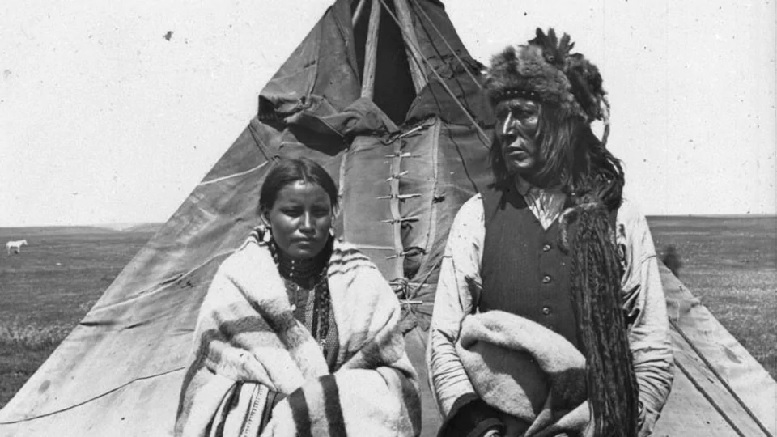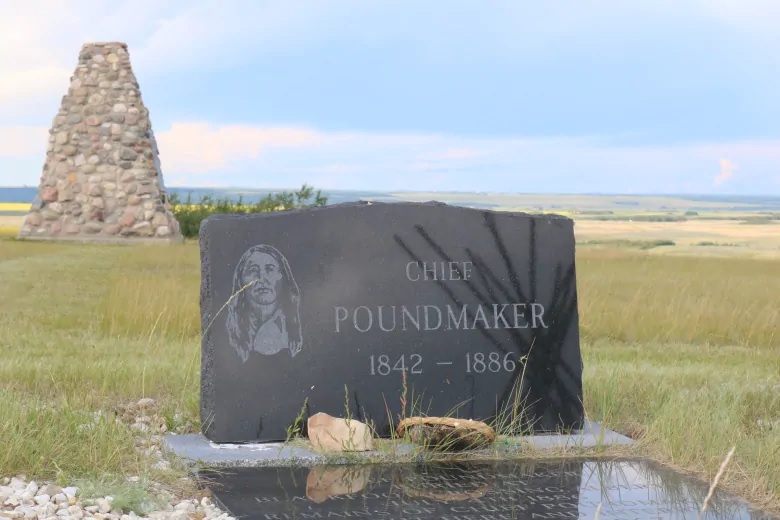An indigenous Chief known as Poundmaker, who had been charged and convicted of treason-felony, will be exonerated today along with an apology from Canada’s Prime Minister, Justin Trudeau.
Canada’s only “civil war” took place shortly after the nation’s creation.
In 1885 a rebellion took place in the western region of the country in what are now the prairie provinces of Manitoba and Saskatchewan.
The Metis, led by Louis Riel, who were agitating against the federal government for land and governing rights, and fought a bloody but losing battle at a place called Batoche.
First Nations peoples were only marginally involved if at all, but were unhappy with the government at this time over what they perceived as the federal government not living up to treaty obligations. The two groups however were lumped together by officials and settlers who misunderstood the two differing situations and the two different peoples..

Chief Poundmaker (Pihtokahanapiwiyin in Cree) pictured with his wife circa 1884 (Library and Archives Canada)
Shortly afterward, Poundmaker and his Siksika and Plains Cree travelled to a government fort at Battleford to speak with government officials and federal police to indicate they were not involved but wanted to negotiate better treatment from government as the bison herds they depended had collapsed and they needed food the government had promised. Officials and townspeople, fearful due to the Metis rebellion would not meet them outside the fort.
After waiting in vain Poundmaker and his people eventually left and returned to their camp at Cut Knife. Federal forces blamed the Cree- rightly or wrongly- for several looted homes and for what they termed was the “siege of Battleford”. The “looting” was more likely simply the hungry Cree seeking food after waiting in vain to speak with officials.
About 300 strong, the federal force attacked the Poundmaker camp but were beaten off. Poundmaker held his warriors back from chasing the federal soldiers, thereby averting what would likely have been a massacre.
A few days later, Poundmaker travelled to Fort Battleford in an effort to prevent further bloodshed. Instead of peace negotiations, he found himself arrested, tried and convicted of the non-capital offence and sent to jail in Manitoba. Having contracted a serious lung disease, he was released after less than a year, but died shortly thereafter at age 44.

The grave of the Chief on the Poundmaker reserve in Saskatchewan (Olivia Stefanovich-CBC)
Indigenous groups have been lobbying for years to correct what they say is a wrongful charge and conviction. They have long insisted he was a peacemaker not a traitor.
Today the Prime Minister will offer an apology and exonerate the Chief in an important ceremony involving several First Nations leaders during which he will place an offering of sacred tobacco on the Chief’s grave.
- Additional information-sources
CBC: J Warick: May 23/19: Sask. First Nation “excited” about exoneration
TorStar: B Doherty: May 23/19: History, Poundmaker, and exoneration by Trudeau
Canadian Press (via Global); S Taylor: Trudeau in Saskatchewan to exonerate Chief (+video interview)
PostMedia (via the Intelligencer): R Warnica: May 23/19: What happened in 1885?







For reasons beyond our control, and for an undetermined period of time, our comment section is now closed. However, our social networks remain open to your contributions.